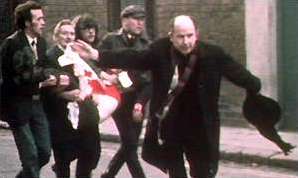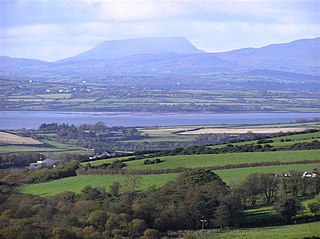Plot
The play is set in 1943 during the Second World War in the small town of Buncrana, on the border with Derry, Northern Ireland, during the Emergency. Dolly West is home after fleeing Italy before the war. She runs the household for her elderly mother Rima, her elder sister Esther and her younger brother Justin. Also living in the house is Esther's husband Ned and the housemaid Anna. Justin, a junior officer in the Irish army, is deeply nationalistic and in favour of Irish neutrality.
But questions are asked of the neutrality of both Ireland and the house, when three foreigners are invited across the border into the house by Rima. The first is Alec, an English officer and former lover of Dolly's. The other two are American soldiers, Marco and Jamie. Soon clashes over issues of loyalty, jealousy, sexual identity and love creep into Dolly West's kitchen.

Bloody Sunday, or the Bogside Massacre, was a massacre on 30 January 1972 when British soldiers shot 26 unarmed civilians during a protest march in the Bogside area of Derry, Northern Ireland. Thirteen men were killed outright and the death of another man four months later was attributed to gunshot injuries from the incident. Many of the victims were shot while fleeing from the soldiers, and some were shot while trying to help the wounded. Other protesters were injured by shrapnel, rubber bullets, or batons, two were run down by British Army vehicles, and some were beaten. All of those shot were Catholics. The march had been organised by the Northern Ireland Civil Rights Association (NICRA) to protest against internment without trial. The soldiers were from the 1st Battalion of the Parachute Regiment, the same battalion implicated in the Ballymurphy massacre several months before.

Derry, officially Londonderry, is the largest city in County Londonderry, the second-largest in Northern Ireland and the fifth-largest on the island of Ireland. The old walled city lies on the west bank of the River Foyle, which is spanned by two road bridges and one footbridge. The city now covers both banks.

The Provisional Irish Republican Army, officially known as the Irish Republican Army and informally known as the Provos, was an Irish republican paramilitary force that sought to end British rule in Northern Ireland, facilitate Irish reunification and bring about an independent republic encompassing all of Ireland. It was the most active republican paramilitary group during the Troubles. It argued that the all-island Irish Republic continued to exist, and it saw itself as that state's army, the sole legitimate successor to the original IRA from the Irish War of Independence. It was designated a terrorist organisation in the United Kingdom and an unlawful organisation in the Republic of Ireland, both of whose authority it rejected.

Henry V is a history play by William Shakespeare, believed to have been written near 1599. It tells the story of King Henry V of England, focusing on events immediately before and after the Battle of Agincourt (1415) during the Hundred Years' War. In the First Quarto text, it was titled The Cronicle History of Henry the fift, and The Life of Henry the Fifth in the First Folio text.
Professor Frank McGuinness is an Irish writer. As well as his own plays, which include The Factory Girls, Observe the Sons of Ulster Marching Towards the Somme, Someone Who'll Watch Over Me and Dolly West's Kitchen, he is recognised for a "strong record of adapting literary classics, having translated the plays of Racine, Sophocles, Ibsen, Garcia Lorca, and Strindberg to critical acclaim". He has also published six collections of poetry, and two novels. McGuinness was Professor of Creative Writing at University College Dublin (UCD) from 2007 to 2018.
In the music of Ireland, Irish rebel songs refer to folk songs which are primarily about the various rebellions against English Crown rule. Songs about prior rebellions are a popular topic of choice among musicians which supported Irish nationalism and republicanism.

Lough Swilly in Ireland is a glacial fjord or sea inlet lying between the western side of the Inishowen Peninsula and the Fanad Peninsula, in County Donegal. Along with Carlingford Lough and Killary Harbour it is one of three glacial fjords in Ireland.
Events from the year 1948 in Ireland.
Events from the year 1939 in Ireland.
Events from the year 1920 in Ireland.
Events from the year 1914 in Ireland.
Pauline Flanagan was an Irish-born actress who had a long career on stage, she was best known in the United States for her role as Annie Colleary, on the television soap opera Ryan's Hope in 1979 and again in 1981. She later returned to the show as Sister Mary Joel.
The Jacques Léglise Trophy is an annual amateur boys' team golf competition between Great Britain & Ireland and the Continent of Europe. It was first played in 1977, as a one-day match before the Boys Amateur Championship, but since 1996 it has been played as a separate two-day match. The venue generally alternates between Great Britain and Ireland and the continent. From 1958 to 1966 a similar match was played between a combined England and Scotland team and the Continent of Europe.

The policy of neutrality was adopted by Ireland's Oireachtas at the instigation of the Taoiseach Éamon de Valera upon the outbreak of World War II in Europe. It was maintained throughout the conflict, in spite of several German air raids by aircraft that missed their intended British targets, and attacks on Ireland's shipping fleet by Allies and Axis alike. Possibilities of both German and British invasions were discussed in the Dáil. Both eventualities were prepared for, although most detailed preparations were done with the Allies under Plan W. De Valera's ruling party, Fianna Fáil, supported his neutral policy for the duration of the war.
This is a chronology of activities by the Provisional Irish Republican Army (IRA), from 1992 to 1999.
Throughout August 2003, various teams prepared for the Rugby World Cup in Australia with a short series of test matches, and involving the Six Nations sides. In addition, Fiji toured New Zealand and South America and Samoa played two matches with provincial teams of New Zealand. Argentina and South Africa played other, not international, Tests.

"Little Moon of Alban" was an American television play broadcast by NBC on March 24, 1958, as part of the television series, Hallmark Hall of Fame. It was written by James Costigan, directed by George Schaefer, and starred Julie Harris and Christopher Plummer.
This is a chronology of activities by the Provisional Irish Republican Army (IRA), in 1990 and 1991.






